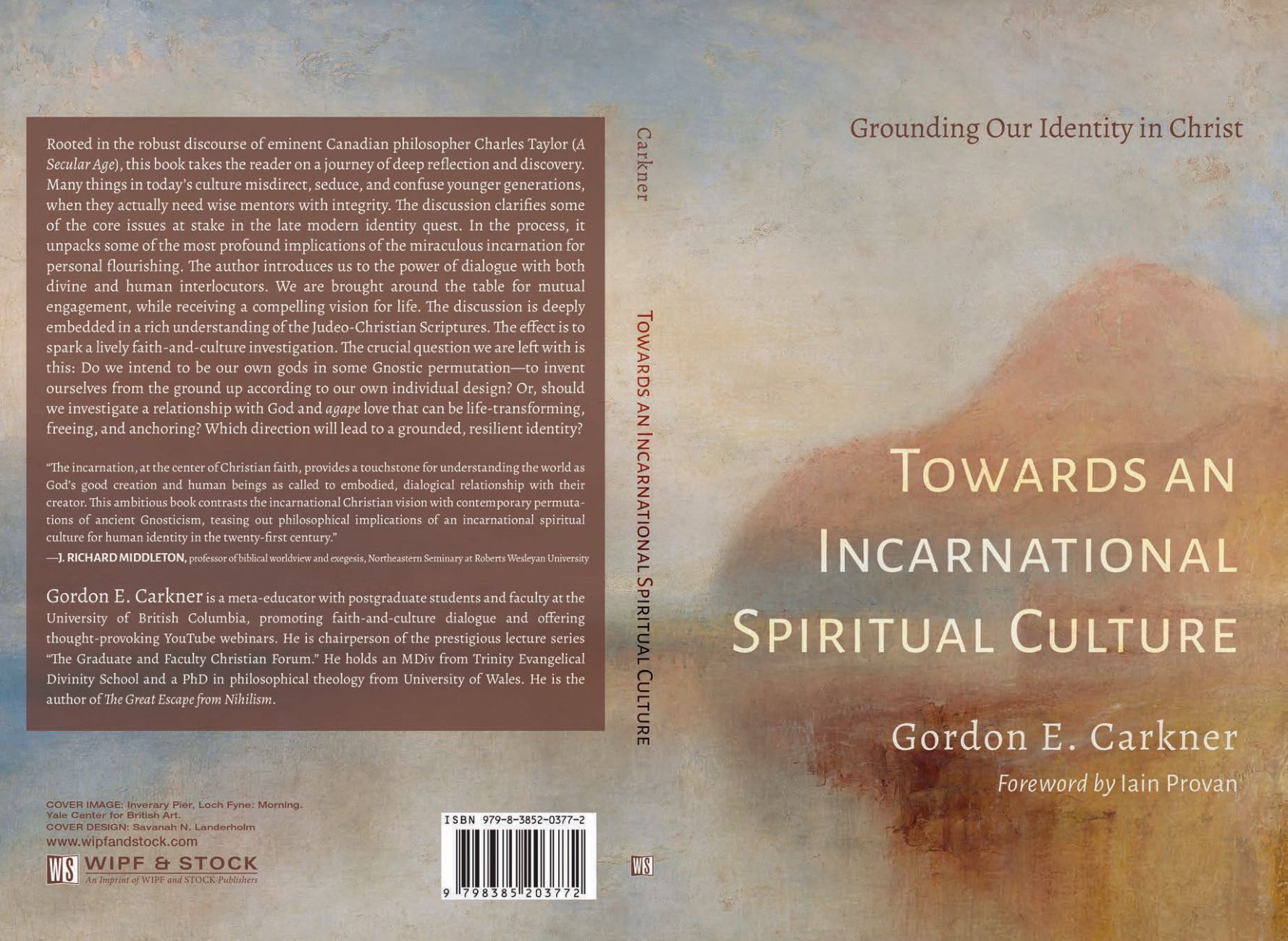
Towards an Incarnational Spiritual Culture: A New Book Release

We are pleased to announce that Dr. Gordon E. Carkner, an OC Team Member, has released a brand new book: Towards an Incarnational Spiritual Culture: Grounding our Identity in Christ!
Everyone looking to buy this new book can find Towards an Incarnational Spiritual Culture now on Amazon (Canada) or coming soon to your local bookstore. For everyone looking for bulk orders, you can reach out here: orders@wipfandstock.com
Towards an Incarnational Spiritual Culture: Grounding our Identity in Christ
By Dr. Gordon E. Carkner
2024, Wipf & Stock

What People are Saying about Towards an Incarnational Spiritual Culture: Grounding our Identity in Christ
“The incarnation, at the center of Christian faith, provides a touchstone for understanding the world as God’s good creation and human beings as called to embodied, dialogical relationship with their creator. This ambitious book contrasts the incarnational Christian vision with contemporary permutations of ancient Gnosticism, teasing out philosophical implications of an incarnational spiritual culture for human identity in the twenty-first century.”
—J. Richard Middleton, Professor of biblical worldview and exegesis, Northeastern Seminary at Roberts Wesleyan University
“It’s easy to see that we are in the grip of a cultural identity crisis! What’s not so easy to see is a way out. Gordon Carkner provides both the head and heart knowledge necessary to ground our identity in Christ in such a way that leads to the flourishing of ourselves and our communities. I highly recommend this thoughtful and passionate engagement with today’s most pressing challenge—our identity.”
—Andy Steiger, Founder and president, Apologetics Canada
“This book develops a profound idea: that in the incarnation, God’s glory and generosity have been revealed in Jesus as publicly accessible truth. Furthermore, the God who was incarnated invites us to try life with him. Be prepared for a provocative journey through several contemporary ideologies elucidated by the insights of philosopher Charles Taylor and other important thinkers. It may result in a deeper appreciation of the presence of the glorious creator whose signs of transcendence surround us.”
—Paul Chamberlain, Professor of ethics and leadership, Trinity Western University
This reflective work by Gordon Carkner comes to us at a poignant moment. More than ever, people need to grapple with the grandeur, beauty, and coherence of the incarnation—the Jesus story. At its core, it is a transformative, great reversal narrative, where prodigals and cynics are invited to become compassionate healing agents, committed to justice and mercy. The book offers a tremendous resource for pastors and church members who want to live the artfulness of agape love.”
—Matthew Menzel, Lead pastor, Westside Church, Vancouver
“Gordon Carkner surveys a wealth of philosophical literature and shares much of his own personal wisdom, showing clearly how strongly influenced our society is by modern versions of Gnosticism and how diametrically opposed that is to the biblical teaching of an incarnational life. An excellent book on a very timely topic which should be of interest to Christians and skeptics alike.”
—Martin Ester, Distinguished professor of computing science, Simon Fraser University
“Having read widely and deeply in contemporary literature and philosophical thought, Gordon Carkner is able to alert us to the ‘minefields’ hidden along the highway of contemporary culture, especially contemporary Western culture. But this is not only a critique of that culture. Being deeply rooted in the Judeo-Christian faith, Carkner is also able to guide us to vistas of great grandeur embedded in the biblical account of creation and re-creation.”
—Sven Soderlund, Professor emeritus of biblical studies, Regent College
“Gordon Carkner’s latest book is an important work of theological anthropology examining the grounds for human dignity through the lens of the incarnation of Christ. Carkner dialogues with thinkers such as Charles Taylor who increase our articulate grasp of the issues and broaden our understanding of the incarnation as the epicenter for a thick identity, grounded in God and nurtured by grace. Such an identity prepares us for a robust engagement with, and critique of, late modern culture.”
—Andrew Lawe, General surgeon and clinical instructor, UBC Southern Medical Program
We live in a world marked by crises of various kinds, but perhaps most deeply and fundamentally by a crisis as to the nature of our humanity. What does it mean to be human?
For example, are human beings essentially minds, trapped temporarily and regrettably in physical bodies? Certainly many artificial intelligence enthusiasts see the world in precisely this way. Marvin Minsky, for example, believes that the mind is all that is really important about life, over against that bloody mess of organic matter that is the body. Out of this conviction arises another: that mind machines represent the next step in human evolution. We ourselves, in our god-like state, ought to create this new species—Machina sapiens instead of Homo sapiens—passing the torch of life and intelligence on to the computer (Rudy Rucker). Our ultimate goal is the conversion of “the entire universe into an extended thinking entity … an eternity of pure cerebration” (Hans Moravec).
From this single example we gather what should already be obvious to us in any case: that our governing ideas about human nature inevitably have significant consequences. They matter individually, affecting how I look at myself, what I agree to do to myself or have done to me, and the goals I set myself. They also matter communally, affecting how I look at and treat other people, and what kind of society I am trying to help to build. In fact, the answer to this question about humanness affects everything else that matters in life. And this means that arriving at good rather than bad answers to the question is a high-stakes game. It means that arriving at the truth of the matter is crucially important. Is it really true, for example, that we are essentially minds that happen to possess bodies that we may or may not consider satisfactory? If we can manage it, should the physical body be discarded like a piece of clothing in pursuit of something more glorious, with the help of technology? Why, or why not?
It is into the very centre of this kind of contemporary discourse that Gordon Carkner has inserted this new book about incarnational spiritual culture, with a view to encouraging readers to ground their identity in Christ, rather than somewhere else. He invites us to consider the great difference between incarnational spiritual culture, on the one hand, and both ancient and modern anti-material Gnosticisms, on the other – rejecting the latter in favor of the former. He explores the Incarnation of Christ as the centre-point of history, giving dignity to embodied persons everywhere, and enabling us to rethink human wisdom and knowledge. He pursues the implications of this Incarnation for human community and communion, contrasting the contemporary will-to-uniqueness, that tears us apart, to the will-to-community, that re-integrates us. And he discusses, finally, the transformative nature of divine goodness, and its necessity for healthy human freedom.
We need all the help we can get in remaining human in these markedly inhumane times. This volume draws on deep and varied resources in offering such help, and I hope that many people will benefit from reading it.
Dr. Iain Provan, Founder of the Cuckoos Consultancy, Author of Cuckoos in our Nest: Truth and Lies about Being Human
In his new book, Gordon Carkner surveys a wealth of philosophical literature and shares much of his own practical wisdom. The book shows clearly how strongly influenced our society is by modern versions of Gnosticism and how diametrically opposed that is to the biblical teaching of an incarnational life, practised first by God himself in Christ and then by his followers. Reading the book as a computer scientist doing research in the area of AI, it occurred to me that Gnosticism also seems to be the root of the misunderstanding in the AI community that reduces humanity to intelligence, to the fulfilling of functions, as evaluated for example by the Turing Test. Last but not least, I know from various experiences of Gordon’s hospitality that he indeed practices an incarnational lifestyle. It is a great book on a very timely topic which should be of interest to Christians and sceptics alike.
Dr. Martin Ester, Professor of Computer Science, Simon Fraser University
It’s easy to see that we are in the grip of a cultural identity crisis! What’s not so easy to see is a way out. Dr. Carkner provides both the head and heart knowledge necessary to ground our identity in Christ in such a way that leads to the flourishing of ourselves and our communities. I highly recommend this thoughtful and passionate engagement with today’s most pressing challenge – our identity.
Andy Steiger, PhD, founder and president of Apologetics Canada and author of Reclaimed: How Jesus Restores Our Humanity in a Dehumanized World.
You can read more about the book here: Coming Soon: Towards an Incarnational Spiritual Culture: Grounding our Identity in Christ